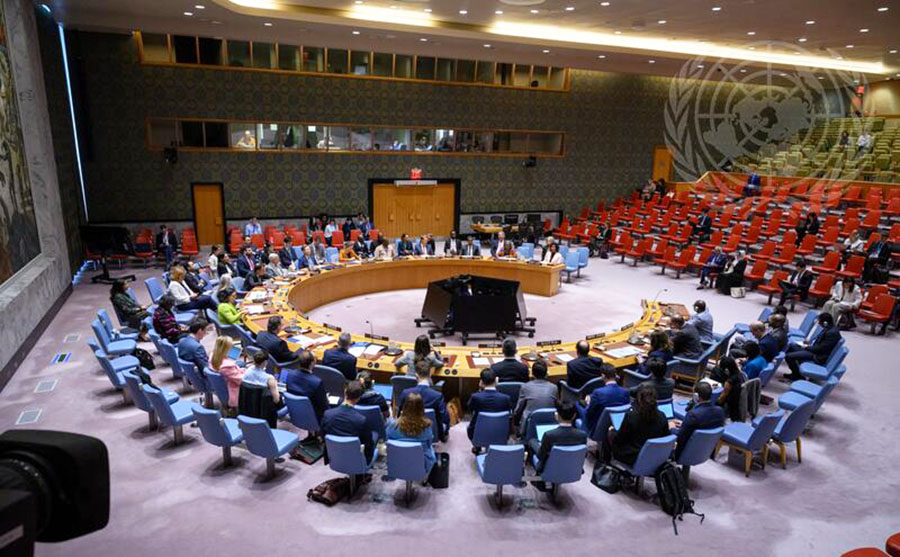
From Brussels to New York: A Week of Searching for a Solution to the Sudan War
News Report - Moatinoon
On the eve of the UN Security Councils special session, which included briefings from UN experts on developments in the war in Sudan, a meeting of the Sudanese Advisory Group was held in Brussels, the Belgian capital, as part of an effort to formulate a more comprehensive vision for the set of peace initiatives proposed since the outbreak of the war between the army and the Rapid Support Forces.
The meeting, held in Brussels, included representatives of regional and international organizations and key countries concerned with the conflict in Sudan, including the United Nations, the African Union, the Intergovernmental Authority on Development, the European Union, and the League of Arab States, in addition to the Kingdom of Saudi Arabia and the United States, as part of a joint effort to revive the political process.
Coordination between initiatives and unification of political visions has been a key concern in the current movement, especially in light of the chaos resulting from the submission of more than 13 proposals by regional and international powers and political actors in Sudan.
On Friday, the UN Security Council heard two shocking briefings from Martha Ama Akia Pobi, Assistant Secretary-General for Africa, and Shaina Lewis, Sudan specialist and senior advisor at the US-based organization Prevent and End Mass Atrocities (PAEMA).
Pobi emphasized that the front lines continue to shift as the Rapid Support Forces (RSF) and the Sudanese Armed Forces (SAF) persist in achieving their military objectives, warning that "the warring parties appear steadfast in their resolve to achieve their military objectives."
She noted the increasing use of advanced weapons, including long-range drones, which has led to the spread of violence to previously stable areas.
Pobi also warned of the conflict spilling over into the region, citing recent reports of violent clashes in the tri-border area between Sudan, Libya, and Egypt, involving the SAF, the RSF, and forces affiliated with the Libyan National Army.
Human Rights Violations
Bobbi also referred to UN human rights reports documenting a tripling of arbitrary killings of civilians between February and April of this year.
She emphasized that "impunity fuels these and other gross human rights violations and abuses. All parties to the conflict must be held accountable."
Ms. Lewiss briefing focused on the deteriorating humanitarian situation, highlighting the more than 15 million children now in need of assistance due to ongoing attacks on civilians.
Returning from a recent visit to Sudan, Lewis recounted stories of critically injured children in hospitals and emphasized that up to 80% of health facilities in conflict zones are no longer functioning.
She also cited examples of indiscriminate attacks on hospitals by the Sudanese Armed Forces (SAF) and Rapid Support Forces (RSF), including a suspected SAF drone strike on June 21 that targeted a hospital in West Kordofan, killing more than 40 people and destroying vital life-saving equipment. Both Lewis and Bobbie raised grave concerns about the widespread use of sexual and gender-based violence against women and girls by warring parties across Sudan.
Government of Hope
Despite ongoing violence and human rights violations, Ms. Bobbie emphasized the importance of the new "Government of Hope," proposed by the newly appointed Prime Minister. She also commended the efforts of the UN Secretary-Generals Personal Envoy to Sudan, Ramtane Lamamra, who is engaging with the Prime Minister, civil society groups, and the warring parties.
Ambassador James Kariuki, Deputy Permanent Representative of the United Kingdom to the United Nations, raised three points. He called for an investigation into the violations committed against civilians in Sudan as a result of the ongoing war, as well as investigations into cases of abduction, recruitment, and violence against children.
He called on both parties to the conflict to fulfill their obligations to protect civilians and civilian infrastructure, in line with international law and the commitments they made in Jeddah.
Kariuki affirmed his countrys support for Assistant Secretary-General Bobby Garcias calls for temporary humanitarian pauses to deliver unhindered relief to all those in need throughout Sudan. He called on the parties to provide security guarantees for humanitarian workers, remove bureaucratic obstacles, and ensure that these steps translate into real improvements in access on the ground.
Ambassador Kariuki emphasized that there is no military solution to this conflict, noting that parallel governing structures and unilateral changes to the constitution will only deepen this crisis. He emphasized respect for Sudans sovereignty, unity, and territorial integrity.
He affirmed the United Kingdoms continued support for efforts aimed at achieving a genuine civilian-led transition that restores peace, protects Sudans sovereignty, and lays the foundations for a democratic future.

